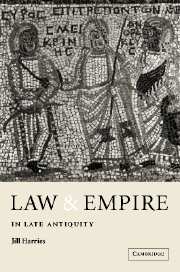Book contents
- Frontmatter
- Contents
- Preface
- Introduction
- 1 The law of Late Antiquity
- 2 Making the law
- 3 The construction of authority
- 4 The efficacy of law
- 5 In court
- 6 Crime and the problem of pain
- 7 Punishment
- 8 The corrupt judge
- 9 Dispute settlement I: out of court
- 10 Dispute settlement II: episcopalis audientia
- Conclusion
- Bibliography
- Index
- Frontmatter
- Contents
- Preface
- Introduction
- 1 The law of Late Antiquity
- 2 Making the law
- 3 The construction of authority
- 4 The efficacy of law
- 5 In court
- 6 Crime and the problem of pain
- 7 Punishment
- 8 The corrupt judge
- 9 Dispute settlement I: out of court
- 10 Dispute settlement II: episcopalis audientia
- Conclusion
- Bibliography
- Index
Summary
Much of law was concerned with how the state regulated disputes between its citizensand punished those who offended against social norms. Readers of Late Antique law-codes would have come early to regulations on civil litigation, much of it based on the codified Praetorian Edictum Perpetuum; they would have had to wait rather longer before reaching he criminal provisions set out in Books 9 of the Theodosian and Justinianic Codes, and Books 47–8, the so-called ‘Libri Terribiles’ of the Digest. How litigants went about conducting lawsuits in civil, and in criminal cases is not easily envisaged, as ancient authors were, on the whole, not given to literary descriptions of trials from the inception of the suit to its final outcome. Even the apparent exceptions, such as martyr-acts, are selective in their presentation, and take what was common procedure at the time for granted. Most revealing of what happened in the hearing itself are a small selection of verbatim court records, from Africa (on the Donatists) and Egypt, which show judge, advocates, witnesses and litigants boisterously engaged inverbal disputes, requiring, on the part of the advocates, a knowledge of the law and prompt reactions to the devices of opponents.
Late Roman justice was, and is, commonly assumed to have been weighted in favour of the rich, who could afford better legal representation and perhaps also the services of more influential friends.
- Type
- Chapter
- Information
- Law and Empire in Late Antiquity , pp. 99 - 117Publisher: Cambridge University PressPrint publication year: 1999
- 1
- Cited by

